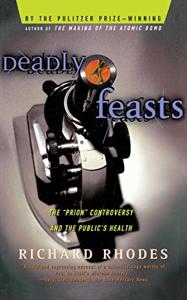
Want to learn the ideas in Deadly Feasts better than ever? Read the world’s #1 book summary of Deadly Feasts by Richard Rhodes here.
Read a brief 1-Page Summary or watch video summaries curated by our expert team. Note: this book guide is not affiliated with or endorsed by the publisher or author, and we always encourage you to purchase and read the full book.
Video Summaries of Deadly Feasts
We’ve scoured the Internet for the very best videos on Deadly Feasts, from high-quality videos summaries to interviews or commentary by Richard Rhodes.
1-Page Summary of Deadly Feasts
Overall Summary
Deadly Feasts is a book by Richard Lee Rhodes about mad cow disease. It traces the origins of this disease and considers its impact on modern society. The book is very popular with scientists, medical professionals, and students for its broad approach to medical science. Rhodes is an American historian who has written both fiction and nonfiction books. He’s won many awards including the Pulitzer Prize for his work The Making of the Atomic Bomb and has also testified before Congress about nuclear energy issues.
In this book, the author discusses how our diet has changed over time. Although we rarely ate meat in the past, it’s very common nowadays. The problem with eating meat is that it contains potentially fatal viruses and bacteria, one of which is incurable. It’s called bovine springiform encephalopathy (BSE), or “mad cow disease,” because cows become “mad” after they’re infected by BSE. This disease affects many people because beef plays such a big role in our diets.
Rhodes explains that BSE is a type of brain disease called transmissible spongiform encephalopathy (TSE). TSEs are fatal and cause irreversible damage to the brain. Rhodes says that most people who contract BSE die within a year from complications such as pneumonia.
In addition, the disease is spreading because of modern meat production. Farmers are feeding cows other cows’ parts as they kill them, which changes the cow’s brain chemistry and makes them cannibals. When humans eat beef from these cannibalized cows, we’re also infected with this disease. Even if you cook your beef well done, there’s still a risk of getting mad cow disease since it can be transmitted through cooking or eating contaminated products.
Although Deadly Feasts is scientifically oriented, the author tries to make it more accessible to a wider audience. He goes back to when scientists first discovered an illness affecting cannibals and traces the virus’s history right up until now. The book uses a detective-mystery style of narrative that’s usually found in fiction books but Rhodes assumes his readers will have some scientific background so he doesn’t explain certain terms.
The disease known as BSE began in New Guinea in the 1800s. The Fore people ate their dead as part of a mourning ritual, and this is where it all started. Now skip forward to the 1950s, when there was an outbreak of a disease called kuru that affected mostly women. This disease made sufferers choke and panic before they died quickly. It seemed contagious but no one knew how it was spreading until 1957 when researchers were able to isolate the cause—it was spread through eating human tissue infected with prions (a protein found in nervous system tissue).
In the 1980s, a disease is discovered that affects cattle. Scientists are unable to determine how it’s transmitted or treated, and they’re even unsure of its cause. Finally, after years of research and debate, scientists believe that humans contract the disease from eating beef infected with mad cow disease.
Although Deadly Feasts focuses primarily on the science behind BSE, it also considers what we can do to eradicate BSE or reduce the risks of contracting it. We can still eat meat as long as we prepare it responsibly. We must reconsider how we industrialize our agriculture and maintain higher standards for animal welfare and disease control.
Rhodes believes that the only way to solve BSE is through vegetarianism or better animal welfare. If we raised animals under sanitary conditions, there would be fewer diseases entering the food chain. Animal testing isn’t an acceptable response to the BSE crisis, and Rhodes is very clear on this point.





